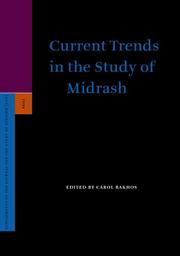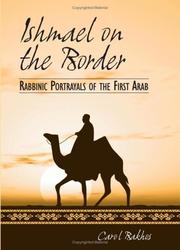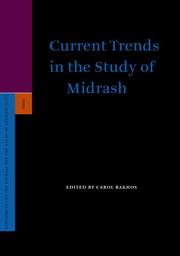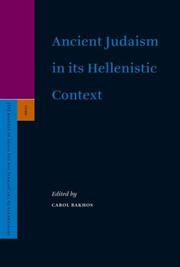| Listing 1 - 10 of 10 |
Sort by
|
Book
ISBN: 9780674050839 0674050835 0674419944 0674419952 9780674419940 Year: 2014 Publisher: Cambridge, MA
Abstract | Keywords | Export | Availability | Bookmark
 Loading...
Loading...Choose an application
- Reference Manager
- EndNote
- RefWorks (Direct export to RefWorks)
The term "Abrahamic religions" has gained considerable currency in both scholarly and ecumenical circles as a way of referring to Judaism, Christianity, and Islam. In The Family of Abraham, Carol Bakhos steps back from this convention to ask a frequently overlooked question: What, in fact, is Abrahamic about these three faiths? Exploring diverse stories and interpretations relating to the portrayal of Abraham, she reveals how he is venerated in these different scriptural traditions and how scriptural narratives have been pressed into service for nonreligious purposes. Grounding her study in a close examination of ancient Jewish textual practices, primarily midrash, as well as medieval Muslim Stories of the Prophets and the writings of the early Church Fathers, Bakhos demonstrates that ancient and early-medieval readers often embellished the image of Abraham and his family--Sarah, Hagar, Ishmael, and Isaac. Her analysis dismantles pernicious misrepresentations of Abraham's firstborn son, Ishmael, and provocatively challenges contemporary references to Judaism and Islam as sibling religions. As Bakhos points out, an uncritical adoption of the term "Abrahamic religions" not only blinds us to the diverse interpretations and traditions of Judaism, Christianity, and Islam but also artificially separates these faiths from their historical contexts. In correcting mistaken assumptions about the narrative and theological significance of Abraham, The Family of Abraham sheds new light on key figures of three world religions.
Abrahamic religions --- Religions --- Relations --- Abraham --- Abrahamic religions. --- 296*83 --- 297.116*2 --- Interreligious relations --- Relations among religions --- Relations. --- Relatie jodendom: islam --- Relatie Islam tot Jodendom --- Abraham, --- Abram --- Abramo --- Abū al-Anbiyāʼ Ibrāhīm al-Khalīl --- Abŭraham --- Avraam --- Avraham --- Avram --- Halil-ül-Rahman İbrahim --- Ibrāhīm al-Khalīl --- Ibrahim --- İbrahim, --- Khalīl Allāh --- Nabi Ibrahim --- אברהם --- אברהם אבינו --- إبراهيم الخليل --- 297.116*2 Relatie Islam tot Jodendom --- 296*83 Relatie jodendom: islam --- Religions - Relations --- Abraham - (Biblical patriarch) --- In rabbinical literature. --- In the Qurʼan.

ISBN: 9004138706 9047417739 9789047417736 Year: 2005 Publisher: Leiden Brill
Abstract | Keywords | Export | Availability | Bookmark
 Loading...
Loading...Choose an application
- Reference Manager
- EndNote
- RefWorks (Direct export to RefWorks)
This collection of essays by many of the leading scholars of midrash and rabbinics reflects the various current methodological approaches to the study of rabbinic scriptural interpretation. During the last three decades of the 20th century scholars in the field made significant forays into literary studies, interdisciplinary studies, and to some degree women's studies. This volume thus illustrates these trends, and highlights several fundamental studies, such as the origins of midrash, the making of critical editions, and the relationship of midrash to other forms of Jewish as well as non-Jewish exegesis. Situating midrash within the broader contexts of hermeneutics, rabbinics and postmodern studies, the volume as a whole presents the reader with a comprehensive view of the kinds of questions and issues scholars in the field are engaging.
Midrash --- 296*13 --- 296*13 Midrasj --- Midrasj --- Jewish literature --- Jewish sermons --- Rabbinical literature --- Midrash.

ISBN: 0791481654 1423795261 9781423795261 0791467597 9780791467596 9780791481653 Year: 2006 Publisher: Albany : State University of New York Press,
Abstract | Keywords | Export | Availability | Bookmark
 Loading...
Loading...Choose an application
- Reference Manager
- EndNote
- RefWorks (Direct export to RefWorks)
Ishmael on the Border is an in-depth study of the rabbinic treatment of Abraham's firstborn son, Ishmael. This book examines Ishmael's conflicted portrayal over a thousand-year period and traces the shifts and nuances in his representation within the Jewish tradition before and after the emergence of Islam.In classical rabbinic texts, Ishmael is depicted in a variety of ways. By examining the biblical account of Ishmael's life, Carol Bakhos points to the tension between his membership in and expulsion from Abraham's household—on the one hand he is circumcised with Abraham, yet on the other, because of divine favor, his brother supplants him as primogenitor. The rabbis address his liminal status in a variety of ways. Like Esau, he is often depicted in antipodal terms. He is Israel's "Other." Yet, Bakhos notes, the emergence of Islam and the changing ethnic, religious, and political landscape of the Near East in the seventh century affected later, medieval rabbinic depictions of Ishmael, whereby he becomes the symbol of Islam and the eponymous prototype of Arabs. With this inquiry into the rabbinic portrayal of Ishmael, the book confronts the interfacing of history and hermeneutics and the ways in which the rabbis inhabited a world of intertwined political, social, and theological forces.
Arabs in the Bible. --- Esau --- Ishmael --- ʻEśaṿ --- עשיו --- ישמעאל --- In rabbinical literature. --- Bible. --- Be-reshit (Book of the Old Testament) --- Bereshit (Book of the Old Testament) --- Bytie (Book of the Old Testament) --- Chʻangsegi (Book of the Old Testament) --- Genesis (Book of the Old Testament) --- Sifr al-Takwīn --- Takwīn (Book of the Old Testament) --- Criticism, interpretation, etc. --- Esau (Biblical figure) in rabbinical literature. --- Ishmael (Biblical figure) in rabbinical literature. --- Ishmael, --- Esau,

ISBN: 9789047417736 9789004138704 Year: 2006 Publisher: Leiden; Boston : BRILL
Abstract | Keywords | Export | Availability | Bookmark
 Loading...
Loading...Choose an application
- Reference Manager
- EndNote
- RefWorks (Direct export to RefWorks)
This collection of essays by many of the leading scholars of midrash and rabbinics reflects the various current methodological approaches to the study of rabbinic scriptural interpretation. During the last three decades of the 20th century scholars in the field made significant forays into literary studies, interdisciplinary studies, and to some degree women's studies. This volume thus illustrates these trends, and highlights several fundamental studies, such as the origins of midrash, the making of critical editions, and the relationship of midrash to other forms of Jewish as well as non-Jewish exegesis. Situating midrash within the broader contexts of hermeneutics, rabbinics and postmodern studies, the volume as a whole presents the reader with a comprehensive view of the kinds of questions and issues scholars in the field are engaging.
Book
Year: 2005 Publisher: Leiden Brill
Abstract | Keywords | Export | Availability | Bookmark
 Loading...
Loading...Choose an application
- Reference Manager
- EndNote
- RefWorks (Direct export to RefWorks)
Hellenism --- Jews --- Jews --- Jews --- Judaism --- Civilization --- Greek influences --- History --- Civilization --- History

ISBN: 9789047414537 9789004138711 Year: 2004 Publisher: Leiden; Boston : BRILL
Abstract | Keywords | Export | Availability | Bookmark
 Loading...
Loading...Choose an application
- Reference Manager
- EndNote
- RefWorks (Direct export to RefWorks)
This volume explores the ways in which Jews lived within the Hellenistic and Greco-Roman contexts, how they negotiated their religious and social boundaries in their own distinctive manner. Scholars demonstrate how the Jewish encounter with Hellenism led not to a conscious struggle with alien forces but rather in many instances to an active re-tailoring and re-shaping of tradition in light of their material, ideological and philosophical surroundings. That is to say, the Jews, a minority people, maintained their identity by adapting the trappings, to varying degrees, of their milieu. These essays also reflect many issues that emerge when we study the development of several aspects of Jewish Civilization through the ages in light of broad socio-political, cultural and philosophical contexts.
Hellenism --- Jews --- Judaism --- Civilization --- Greek influences --- History
Book
ISBN: 9780198748496 0198748493 0191065374 0191811084 Year: 2017 Publisher: New York Oxford University Press
Abstract | Keywords | Export | Availability | Bookmark
 Loading...
Loading...Choose an application
- Reference Manager
- EndNote
- RefWorks (Direct export to RefWorks)
This book brings together scholars to consider Islamic revelation, with particular focus on the Qur'an. The collection provides a wide-ranging survey of the development and current state of Qur'anic studies in the Western academy. The issue is what we can learn in this way about the manner in which the 'polytheists' of the Qur'an related to the Jewish and Christian traditions: were they Godfearers in the sense familiar from the study of ancient Judaism? It looks at the Qur'an as a text of Late Antiquity, not just considering those features of it that could be seen as normal in that context, but also identifying what is innovative about it against the Late Antique background. Here the focus is on the 'believers' rather than the 'polytheists'. The volume also engages in different ways with notions of monotheism in pre-Islamic Arabia. This collection provides a broad survey of what has been happening in the field and concrete illustrations of some of the more innovative lines of research that have recently been pursued.
Islam --- Islam. --- Vorgeschichte. --- Dschahilijja. --- Spätantike. --- History. --- Qurʼan --- Qurʼan. --- Koran. --- Criticism, interpretation, etc. --- 297.181*1 --- 297.181*1 Koran en Bijbel --- Koran en Bijbel --- Vorgeschichte --- Dschahilijja --- Spätantike --- Koran --- Spätantike.

Abstract | Keywords | Export | Availability | Bookmark
 Loading...
Loading...Choose an application
- Reference Manager
- EndNote
- RefWorks (Direct export to RefWorks)
Book
ISBN: 9783161501876 316150187X Year: 2010 Publisher: Tubingen Mohr
Abstract | Keywords | Export | Availability | Bookmark
 Loading...
Loading...Choose an application
- Reference Manager
- EndNote
- RefWorks (Direct export to RefWorks)
Parsismus.
---
Sassaniden.
---
Talmud bavli.
---
Talmud
---
Iranian influences
---
Iran
Periodical
Year: 2014 Publisher: Göttingen V&R unipress
Abstract | Keywords | Export | Availability | Bookmark
 Loading...
Loading...Choose an application
- Reference Manager
- EndNote
- RefWorks (Direct export to RefWorks)
| Listing 1 - 10 of 10 |
Sort by
|

 Search
Search Feedback
Feedback About UniCat
About UniCat  Help
Help News
News